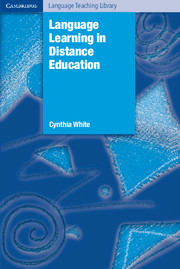6 - The initial experience of distance language learning
Published online by Cambridge University Press: 04 February 2010
Summary
Introduction
This chapter focuses on the initial experience of distance language learning from two perspectives. The first perspective looks at the experience of distance language learning from the outside in. The focus is on the factors and processes involved in adjusting to the experience of distance learning. It is based principally on the observations and insights of distance educators into how individuals are socialised into a distance learning environment, and on the need to achieve congruence between individual attributes, the learning environment and personal circumstances.
The second perspective concerns learners' perceptions of the environment and their place within it. It represents an insider's perspective, that is how language learners experience distance language learning, and the knowledge and beliefs which they develop in relation to that experience. Since the initial experience of distance language learning presents a range of challenges to learners – it has been identified as a critical point in terms of a decision to persist with learning or to withdraw from the process – this period is foregrounded in the chapter. Insights are derived from quite detailed longitudinal work with language learners new to distance learning, beginning with their initial expectations of that environment.
Understanding the learners' framework of experience – that is the content and structure of the expectations, beliefs and knowledge they bring to the language learning process – is important, because until recently distance language learners have tended to be considered in more abstract terms. Consequently, the nature and impact of their framework has tended to be little understood and all too easily overlooked.
- Type
- Chapter
- Information
- Language Learning in Distance Education , pp. 124 - 148Publisher: Cambridge University PressPrint publication year: 2003



